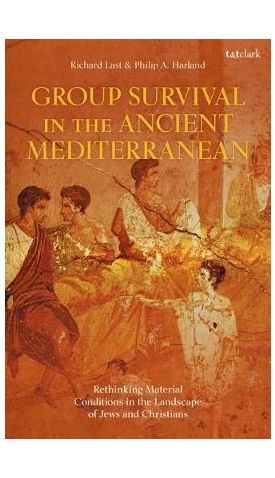אנו משתמשים ב-Cookies כדי לשפר את החוויה שלך. כדי לקיים ההנחיה החדשה של e-Privacy, עלינו לבקש את הסכמתך להגדיר את ה-Cookies. קבלת מידע נוסף.
515.00 ₪
Group Survival in the Ancient Mediterranean
515.00 ₪
ISBN13
9780567657480
יצא לאור ב
Edinburgh
עמודים
240
פורמט
Hardback
תאריך יציאה לאור
16 באפר׳ 2020
Philip A. Harland and Richard Last consider the economics of early Christian group life within its social, cultural and economic contexts, by drawing on extensive epigraphic and archaeological evidence. In exploring the informal associations, immigrant groups, and guilds that dotted the world of the early Christians, Harland
and Last provide fresh perspective on the question of how Christian assemblies and Judean/Jewish gatherings gained necessary resources to pursue their social, religious, and additional aims.
By considering both neglected archaeological discoveries and literary evidence, the authors analyse financial and material aspects of group life, both sources of income and various areas of expenditure. Harland and Last then turn to the use of material resources for mutual support of members in various groups, including the importance of burial and the practice of interest-free loans. Christian and Judean evidence is explored throughout this book, culminating in a discussion of texts detailing the internal financial life of Christian assemblies as seen in first and second century sources, including Paul, the Didache, Justin Martyr, and Tertullian. In shedding new light on early Christian financial organisation, this volume aids further understanding of how some Christian groups survived and developed in the Greco-Roman world.
| עמודים | 240 |
|---|---|
| פורמט | Hardback |
| ISBN10 | 0567657485 |
| יצא לאור ב | Edinburgh |
| תאריך יציאה לאור | 16 באפר׳ 2020 |
| תוכן עניינים | Introduction Part 1: Accessing Resources 1) Benefaction 2) Fees, fines, and the common treasury 3) Collections and offerings Part 2: Managing Expenses - Social, Religious, and Other 4) Meeting-places and building expenses 5) Social and religious expenses Part 3: Supporting Members 6) Burial 7) Mutual support and "charity" Conclusion: Assessing the Survival of Christian Groups |



Login and Registration Form